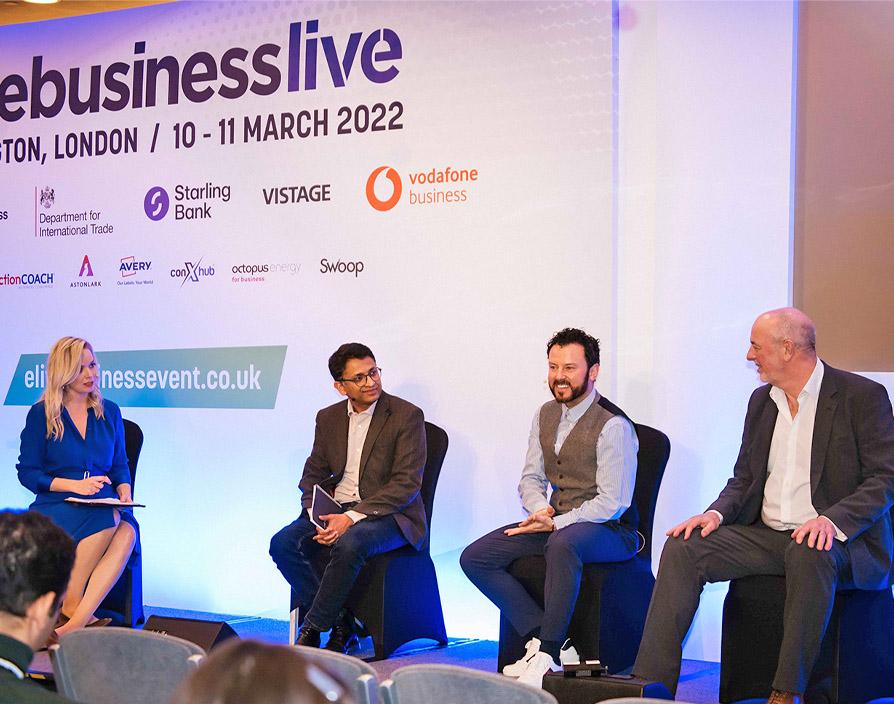Jacob Thundil MBE, founder and Managing Director of Cocofina, Dr Johnny Paterson, Founder of Dr PAWPAW and Sean Flanagan, Operations Director for UK & France at Avery took to the stage on the second day of Elite Business on 12 March in the Overseas Expansion talk, sharing the many hurdles with exporting abroad since Brexit and Covid, and how they navigated their businesses in a challenging global landscape.
The UK is facing an unprecedented increase in the cost of key raw materials impacting thousands of businesses across the country. Raw material availability is worsening across Europe and globally since Brexit, Covid and the conflict in Ukraine. Global shipping companies have been overwhelmed by surging demand, so retailers have now had to pay more to transport goods. Some businesses have resorted to raising the prices of their products because of this. However, Dr Paterson, founder of PAWPAW said he has chosen not to increase product prices saying he wants to put customers first. He said: “I wanted to do it (raise prices) last year, but I felt that in the current climate I just wanted to play it safe, not cause too many problems with the customers that we already had. I just wanted to make sure we kept our customers and they continued to buy and we carried on doing the volume that we do. We are an FMCG business so it’s all about turnover of goods, so as soon as it felt comfortable to do so we’ve done it. And we’ve got a lot of support from our customers. I think we’ve done it fairly; we’ve chosen the right price. We’re going to try and not increase again too quickly.”
Explaining Avery’s exporting journey thus far, Sean Flanagan, Operations Director for UK & France at Avery said: “The exporters been interested in us because we’ve launched new products in the last few years in the e-commerce area, and it’s all been about trying to build competence in where we are the strongest. In the UK, we’ve launched and we’ve served the rest of Europe as best as we could. But as that journey’s gone along, we’ve started to build expertise in France, in Germany, and that’s been followed by a little bit of manufacturing to just become more competent in each region but fairly slowly and with some patience.
Since Brexit, businesses have had to make adjustments to their practices. Sean explained how businesses had to make changes to labelling with new laws implemented since the UK left the EU, which created some delays in exports. Once the new procedures were in place and running smoothly, it did not cause major implications in the long run. He explained: “Labelling in its most general form of an administrative document, UK businesses are amazingly adaptable and we’ve worked really hard to prepare for it. Some things like VAT the government didn’t help us with much at the time beforehand, we got there. But what you have to remember is the business is in the European Zone, so you had to work really closely and help your partners. The first couple of months were pretty tough, working out all the customs declarations, it took us a while. It wasn’t as bad as we feared and it’s still relatively easy to do business you just lose a bit of lead time and you have to do more labelling and more documentation.”
Has Brexit tarnished the ‘Made in Britain’ brand? Jacob Thundil MBE, founder and Managing Director of Cocofina, said there have been mixed perceptions with distributors abroad. He explained how a customer in Europe became overwhelmed by the increased export regulations since Brexit, which inevitably made them decide not to import products from the UK again. He explained: “A customer in Poland bought one of our products during the Brexit transition phase. And a poor lady was dealing with the documents, and we were organically certified as well which required a bit more paperwork. Britain is now treated as a third country, so if you don’t produce organic food here you can’t export it. I remember her calling me and she was in tears and she said ‘If the documents don’t get here, I’m going to quit’. I asked her, ‘Why are you going to quit over an order?’ She said, ‘I’ve put in a lot of effort, I’m not doing this again’. It was very painful. My Dutch customer talks about Brexit in terms of Boris Johnson, so she doesn’t think it’s ‘Made in Britain’ that got damaged. I’m quite satisfied. I would prefer if the ‘Made in Britain’ brand is preserved. There are different perspectives on this.”
Share via:








































